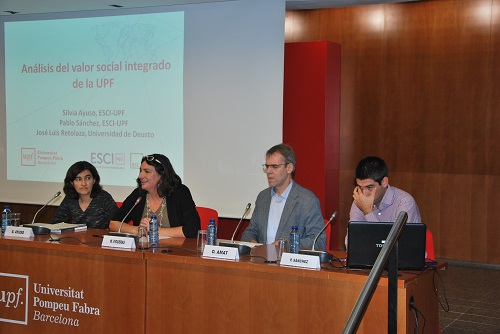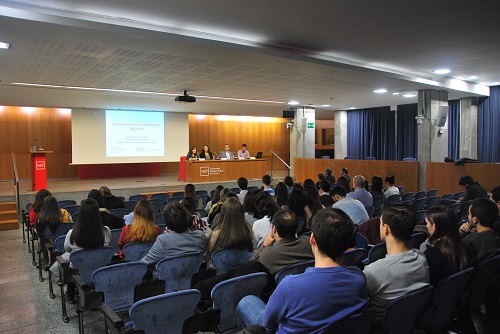The social value generated by UPF accounts for more than four times the amount received through public funding
The social value generated by UPF accounts for more than four times the amount received through public funding
The social value generated by UPF accounts for more than four times the amount received through public funding
This is one of the conclusions of a study by the ESCI-UPF’s Mango Chair for Social Responsibility, which used an innovative methodology that allows objectivizing and monetizing the value created by an organization for all its stakeholders. The study will be presented at an “Open Classroom” session at the Faculty of Economic and Business Sciences on 21 November on the Ciutadella campus.
 “Analysis of the integrated social value of a public university. An approach to the case of Pompeu Fabra University”, by Silvia Ayuso, Pablo Sánchez and José Luis Retolaza, as part of the ESCI-UPF Mango Chair in Corporate Social Responsibility, is a study that aims to analyse and quantify in monetary terms the social value of UPF, applying the methodology for quantifying integrated social value (ISV).
“Analysis of the integrated social value of a public university. An approach to the case of Pompeu Fabra University”, by Silvia Ayuso, Pablo Sánchez and José Luis Retolaza, as part of the ESCI-UPF Mango Chair in Corporate Social Responsibility, is a study that aims to analyse and quantify in monetary terms the social value of UPF, applying the methodology for quantifying integrated social value (ISV).
The study, which is supported by the UPF Board of Trustees, will be presented on Tuesday 21 November at 12:30 pm in the auditorium of the Ciutadella campus, within the “Open Classroom” sessions organized by the Faculty of Economics and Business Sciences. The presentation will be made during the course of a class of the subject “Analysis of Financial Statements” of the University's double bachelor's degree in Law and Business Management, given by Oriol Amat, full professor of Financial Economics at the University who has also participated in the preparation of the work.
The session will feature the participation of Mònica Figueras, vice-rector for projects for social commitment and quality, who will kick off the session; professor Oriol Amat, who will speak about the importance of social value in relation to other types of value in the economic field, and ESCI-UPF researchers Silvia Ayuso and Pablo Sánchez, study authors, who will speak about its content, context and how it was conducted.
The methodology has led to some surprising conclusions
 The study methodology is based on a multifaceted analysis model, which allows objectifying the value created by an organization for all its stakeholders, and follows a process called social accounting known as Spoly, which consists of a series of phases.
The study methodology is based on a multifaceted analysis model, which allows objectifying the value created by an organization for all its stakeholders, and follows a process called social accounting known as Spoly, which consists of a series of phases.
The first step involves identifying the stakeholders, which in the case of UPF would be students, alumni, students’ families, teaching and research staff and administrative and services staff, faculty, suppliers and contractors, public authorities, institutions and organizations, both of the UPF group and of the university, social and media environment.
Then, the perceived variables are identified via in-depth interviews held with representatives chosen from the various stakeholders. The value variables obtained from the interviews are reflected in an array of interests, and suitable indicators and proxies are sought (approach to value) to allow monetizing them through calculation algorithms. Finally, the integrated social value (ISV) is calculated, which includes both the social value generated through economic activity (through the accounting indicators) and the specific social value, generated by the different stakeholders not including the market transaction, and monetized with the help of indicators and proxies.
So, considering this method, and although this is an initial approximation with partial data, the specific social value of UPF obtained for 2015 (170,222,157 euros) by far exceeds the social value generated by its economic activity for the same tax year (110,462,908 euros). At the same time, it should be noted that UPF’s integrated social value of 247,757,999 euros represents more than four times the amount received from public funding.
An innovative tool to encourage the analysis of universities’ social value
According to Monica Figueras, vice-rector for projects for social commitment and quality, this methodology is a useful tool for strategic planning and communication with stakeholders: “The study has a strategic approach, related to social commitment, which is the university’s third mission, after teaching and research. To ascertain the value and the benefits generated by the university for society, apart from the money, and how the society values us, is vital for an institution”.
This methodology has already been used in some SMEs and foundations. Also, in some international universities, as, for example, in the United Kingdom (social return on investment), but always based on the vision and the indicators that the university and the authorities feel are important.
In the case of the study drafted by the ESCI-UPF Mango Chair in Corporate Social Responsibility, “it is a totally different approach, since it is based on the expectations of the stakeholders with which the University relates”, says Mònica Figueras. According to the vice-rector, “the idea is to perform this self-assessment every year, to compare us with ourselves, and also serve as a stimulus so that other universities and higher education institutions integrate social value analysis into their accounting methods”.
Related to the subject matter analysed in this study, but based on a different methodology that has a more global vision, the ACUP is organizing the symposium “The socio-economic impacts of public universities and public research in Catalonia. Innovation as a driving force of economic and social progress”, which will take place on 20 November at the la Pedrera auditorium. In the framework of the symposium, the report “Socioeconomic impacts of public universities and the public research system of Catalonia” will be presented, a novel exercise that analyses and quantifies the social and economic impacts of the activities of public universities and the public system of Catalonia.
